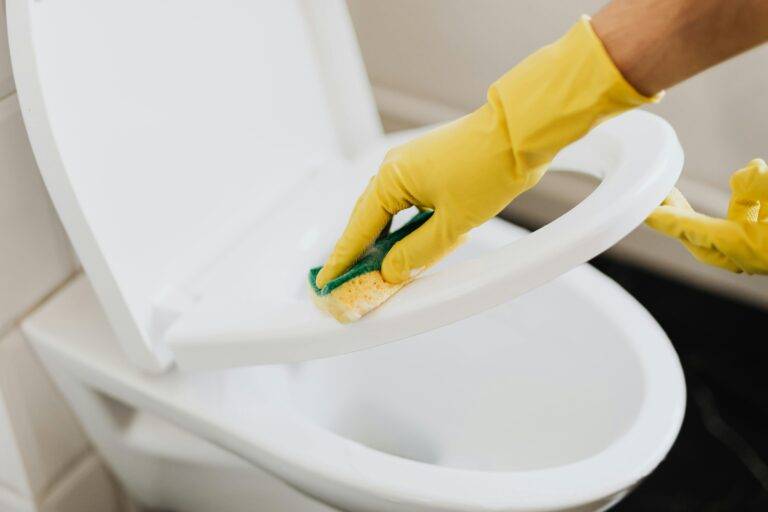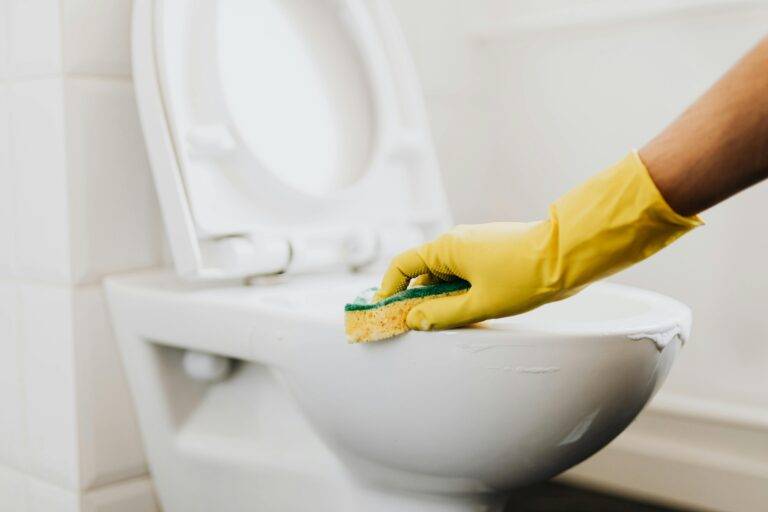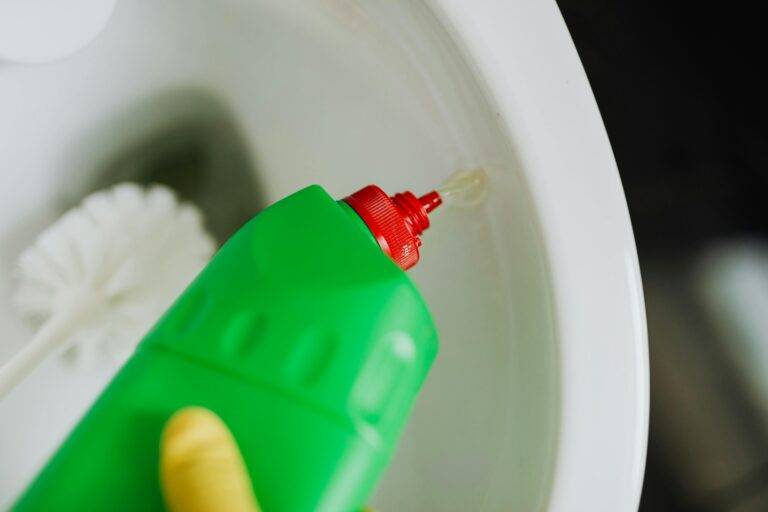When it comes to tackling tough stains and grime, the best ammonia cleaner is an essential asset for any household. Known for its powerful cleaning properties, ammonia—an efficient compound of nitrogen and hydrogen—is particularly effective at breaking down dirt and grease on various surfaces. From glass to tile, ammonia cleaner for stains has become a go-to solution for many cleaning tasks around the home.
Kleanmatters offers a highly effective ammonia solution that excels at cutting through tough stains and grease, making it an ideal choice for enhancing the cleanliness and shine of hard surfaces1. Its effectiveness extends to removing mildew stains, ensuring that you not only target dirt but also protect your space from unsightly mold and grime1. With numerous ammonia cleaner uses, you’ll find that sparkling surfaces are just a spray away.
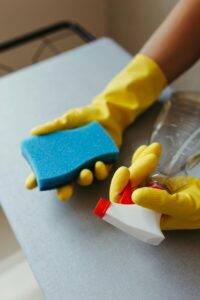
What is Ammonia Cleaner and How Does It Work?
Ammonia cleaner is a powerful solution commonly utilized in both household and commercial cleaning tasks. This potent cleaner typically consists of a 5% to 10% ammonia solution in water, making it effective against various contaminants like animal fats, vegetable oils, and cooking grease2. The way ammonia cleaner works relies on its ability to break down stains on a molecular level, rendering dirt easier to remove and leaving surfaces gleaming3.
The cleaning properties of ammonia stem from its chemical nature, which allows it to dissolve grease and grime efficiently. Household ammonia is renowned for its versatility and affordability, applicable on an array of surfaces—from countertops and floors to bathroom fixtures2. However, caution is advised, as mixing ammonia with bleach can lead to the formation of toxic chloramine gases, which pose serious health risks4.
While the effectiveness of ammonia cleaner is notable, the strong odor can be a significant drawback, and exposure risks include eye and respiratory irritation3. It is essential to use ammonia solutions responsibly, especially since ammonia can be harmful to aquatic life when washed down the drain. For more information on proper usage and safety precautions, you can refer to a detailed article about ammonia cleaners here3.
Benefits of Using Ammonia Cleaner
The benefits of ammonia cleaner make it a popular choice for many households. One of the key advantages of ammonia cleaner is its cost-effectiveness; a 64-ounce bottle can typically be purchased for less than $5, making it much less expensive compared to brand-name cleaners56. It is particularly effective for cutting through tough stains caused by animal fats, cooking grease, and various other substances on surfaces like carpets and upholstery6. When it comes to glass surfaces, ammonia’s quick evaporation reduces streaks, allowing for a gleaming finish on windows and mirrors76.
Ammonia cleaner features include its versatility for a range of cleaning tasks, from cleaning microwaves and ovens to treating heavy-duty grime on stove tops6. For instance, a simple mixture of 1 tablespoon of clear ammonia with 2 cups of water can create an effective glass cleaner5. Its ability to tackle fabrics is impressive as well; a blend of clear ammonia and dish soap can help remove stubborn stains56. Furthermore, ammonia can double as a jewelry cleaner, effectively cleaning gold, silver, or platinum items when soaked in a diluted solution6.
In summary, the advantages of ammonia cleaner are numerous, making it an essential product in many homes. It’s budget-friendly, highly effective on tough stains, and provides a streak-free shine on surfaces while being versatile enough for various applications56.
Tips for Using Ammonia Cleaner Safely
Safety is paramount when considering ammonia cleaner safety tips. Always begin by wearing protective gear, such as gloves and goggles, to avoid skin irritation and eye damage during handling ammonia cleaner. Ensuring proper ventilation is critical; work in a well-ventilated area to prevent the inhalation of harmful fumes, which can cause severe respiratory irritation and chemical burns to the airways8.
Mixing ammonia with bleach leads to the formation of toxic chloramine gases, so these substances should never be combined8. Reading the manufacturer’s instructions carefully will provide insights on safe ammonia cleaner use and dilution requirements specific to the tasks you are undertaking. For general cleaning purposes, household ammonia solutions typically contain 5% to 10% ammonia, making them safer for everyday tasks8.
When handling ammonia cleaner, make sure to keep the product out of reach of children and pets. If an accident occurs, such as skin contact or ingestion, seek immediate assistance from poison control or emergency services, as someone calls for help due to accidental exposure every 15 seconds9.
For effective cleaning, always dilute ammonia properly based on the task. For instance, a solution for cleaning floors requires mixing ½ cup of liquid ammonia into ½ gallon of water10. Following these ammonia cleaner safety tips will ensure a safer cleaning experience while maximizing efficiency and results.
Comparing Ammonia Cleaners on the Market
When it comes to the effectiveness of ammonia cleaners, a variety of products dominate the market, each offering unique strengths and formulations. Among the 19 cleaning products that contain ammonia, categories include floor cleaners, glass cleaners, and bathroom cleaners, all designed to tackle tough stains and grime efficiently11. Consumer insights highlight that the best ammonia cleaners are often those tailored for specific tasks, like mold removal on non-porous surfaces, due to ammonia’s chemical properties12.
Many brands have emerged, providing alternatives to traditional ammonia cleaners. Companies like The Laundress and Seventh Generation focus on natural ingredients for their ammonia-free products, appealing to a growing consumer demand for eco-friendly cleaning solutions11. Reviews and testimonials help consumers compare ammonia cleaners effectively, shedding light on their performance against common household challenges.
It’s also crucial for buyers to consider labeled ingredients when selecting cleaners. Tools such as SmartLabel.org can aid in verifying whether a product contains ammonia, guiding users in making informed purchasing decisions while navigating the diverse landscape of cleaning products11.
Ultimately, the variety available means consumers can easily compare ammonia cleaners not just by price, but by their cleaning capabilities and safety profiles, which are important factors during the selection process. Doing so can ensure that households are equipped with the most suitable ammonia cleaners tailored to their specific cleaning needs.
Best Household Uses for Ammonia Cleaner
The versatility of ammonia cleaner becomes evident in its many household uses. This powerful cleaner is ideal for surfaces such as countertops, sinks, and tiles, making it a popular choice for maintaining a clean home. Some effective ammonia cleaner uses include laundry applications, where it excels at removing stubborn stains from fabrics. By adding a small amount of ammonia to your laundry routine, you can boost your detergent’s cleaning power and tackle tough marks with ease.
Specific ammonia cleaner applications also encompass cleaning tasks like scrubbing oven racks. Soaking grill grates in ammonia overnight can yield impressive results by loosening baked-on grime. This technique simplifies the cleaning process, allowing you to spend less time battling stubborn residues. For those dealing with tough stains and odors, mixing ammonia with water can create an effective solution that targets mildew and brightens your white shoes.
Considering safety, use household ammonia solutions that typically contain 5% to 10% ammonia for general cleaning purposes, as this concentration provides effective results without excessive risk. Avoid combining ammonia with bleach, as this can produce harmful toxic fumes, creating a dangerous situation in your home. With an understanding of these considerations and effective ammonia cleaner uses, you can maximize the utility of ammonia cleaner for various household tasks while keeping safety in mind1314.
Ammonia Cleaner vs. Other Cleaners
When it comes to an ammonia cleaner comparison with other common cleaning agents like bleach, vinegar, and commercial detergents, the properties of ammonia make it particularly effective for tackling tough stains and grime. Ammonia, composed of nitrogen and hydrogen, is widely utilized in products like Pledge, Resolve, and Windex, especially for cleaning windows and kitchen surfaces15. In contrast, bleach, which is typically sodium hypochlorite or sodium percarbonate, serves as an excellent disinfectant and mildew remover but poses its own safety risks when mixed with other chemicals15.
Cleaner effectiveness varies depending on the scenario. Ammonia excels at breaking down grime, oils, and fats, offering a potent solution when paired with water15. On the other hand, sodium hypochlorite found in Clorox bleach works effectively at destroying mold and germs but can damage fabrics upon contact16. The versatility of ammonia includes the removal of hard water stains and is safe for many surfaces when diluted properly15.
Comparing safety profiles reveals that both ammonia and bleach can irritate skin and eyes. Ammonia is particularly corrosive and poses serious risks with excessive exposure15, while bleach can produce toxic fumes, especially when combined with certain household cleaners15. Vinegar, a common alternative to both, utilizes acetic acid to loosen dirt and oil but may lack effectiveness against specific bacteria and viruses17.
Ultimately, choosing between ammonia vs. other cleaners hinges on the specific cleaning task at hand. While ammonia’s benefits are impressive for certain tasks, understanding the cleaner effectiveness of each option will help consumers make informed decisions based on the nature of their cleaning needs.
Customer Reviews: What People Are Saying
Consumer feedback regarding ammonia cleaners reveals a varied range of experiences. Many appreciate the effectiveness of these products in tackling tough stains and grime, which is a consistent highlight in customer reviews ammonia cleaner. More users report positive user experiences ammonia cleaner, particularly when it comes to disinfecting surfaces and freshening up items around the home.
Nevertheless, not all reviews are glowing. Some customers express dissatisfaction with specific brands, particularly Clean Boss, citing performance issues that do not meet advertised claims. These concerns often lead to a notable number of one-star reviews and frustrations with customer service as well18. Strong odors are a common subject in these reviews, where comparisons are made to bleach and traditional cleaners18. While a portion of users finds the smell to be fresh, others find it overwhelming and liken it to mothballs18.
Additional complaints frequently surface about the product’s sprayer mechanism, which some users report breaks down after minimal use18. Reports of headaches and discomfort attributed to the strong scent raise safety concerns18. Comparisons with well-known cleaning products such as Clorox suggest that Clean Boss may not perform as effectively as bleach-based alternatives18. Moreover, questions regarding the transparency of ingredient disclosures and potential allergens contribute to user concerns18.
Despite these criticisms, many users showcase their versatility by sharing experiences of using ammonia cleaners for various tasks, from disinfecting kitchen surfaces to freshening shoes, reflecting the diverse applications of these products18. Such anecdotes provide valuable insights for prospective buyers looking to gauge the effectiveness and suitability of ammonia cleaners for their needs.
How to Make Your Own Ammonia Cleaner
Create ammonia cleaner at home with a few simple ingredients for an effective DIY ammonia cleaning solution. Start by mixing 1/2 cup of soapy ammonia with 1 pint of rubbing alcohol and 13 1/2 cups of water to yield one gallon of a powerful glass cleaner19. For smaller batches, consider adapting this recipe to fit a 32 oz. spray bottle by using 1/8 cup (1 oz) of soapy ammonia, 1/2 cup (4 oz) of rubbing alcohol, and 3 1/3 cups of water. This concise formula is perfect for maintaining sparkling windows and surfaces19.
When you create ammonia cleaner, explore the option of making “sudsy ammonia” by combining pure ammonia with dish soap and varying the concentration according to your cleaning needs20. Keep in mind that while this mixture effectively tackles tough stains, thorough rinsing is essential to avoid chemical residues that could lead to damage over time20. A recipe for a more concentrated sudsy cleaner involves mixing 5 teaspoons of water, 2 teaspoons of ammonia, and 1 teaspoon of dish soap for a 26-32 oz. solution19.
Lastly, remember to exercise caution when using these solutions, particularly if they contain additional chemicals like lemon or lime, as these can be corrosive20. Always test the cleaner on a hidden area and use a microfiber cloth or paper towel for best results. Experiment with these recipes to find the most suitable homemade ammonia cleaner for your needs, ensuring that your environment stays clean and safe.
Frequently Asked Questions About Ammonia Cleaner
Many consumers seek reliable information regarding ammonia cleaner. Ammonia cleaner FAQs often revolve around its effectiveness and suitability for different surfaces. It is well-known for cutting through tough grease and grime, making it exceptionally useful for various cleaning tasks. The cleaner is typically effective on common stains such as blood, wine, and coffee, among others, providing significant help in maintaining a spotless home21.
Questions about ammonia cleaner frequently include safety concerns. Household ammonia solutions usually contain 5% to 10% ammonia for general cleaning, while higher concentrations should be avoided for everyday use22. Proper dilution is vital; a recommended ratio is one part ammonia to four parts water for general cleaning tasks. Always ensure adequate ventilation to prevent inhaling harmful fumes when using these products21.
Regarding the environmental aspect, it is notable that ammonia has been identified at numerous National Priority Sites by the Environmental Protection Agency (EPA), raising awareness about its impact23. The Occupational Safety and Health Administration (OSHA) places strict regulations on ammonia exposure, recommending no more than 25 parts per million in an eight-hour workday23. This emphasis on safety underscores the importance of responsible cleaning practices.
A common misconception involves mixing ammonia with bleach, which is highly dangerous and results in toxic chloramine gases. This risky combination can lead to serious health issues22. Understanding these ammonia cleaner facts is crucial for any household looking to maintain both a clean environment and a safe living space.
For further inquiries and detailed assistance, feel free to reach out here for more information on ammonia cleaner usage and safety guidelines.
Eco-Friendly Alternatives to Ammonia Cleaner
Many individuals are increasingly seeking eco-friendly cleaners as a viable alternative to traditional ammonia cleaners. Options like vinegar and baking soda have garnered attention for their effectiveness against tough stains and grime. For a simple and effective cleaning solution, using 1/4 cup of vinegar combined with water can serve as a mild green cleaner that is both powerful and non-toxic24. The rising demand for environmentally friendly cleaning products reflects a growing awareness of the potential hazards posed by conventional choices, such as ammonia, which can contribute to respiratory irritation and environmental damage25.
Plant-based cleaners stand out as non-toxic cleaning alternatives, providing effective ways to maintain cleanliness without compromising ecological values. In fact, enzymes are increasingly recognized for their biodegradable and non-toxic properties, making them a strong candidate in the realm of green cleaning options25. Those looking for homemade solutions can create an all-purpose cleaner by mixing 1/4 cup of vinegar with warm water, proving that effective cleaning doesn’t have to involve harsh chemicals.
Shifting to eco-friendly cleaners can not only improve indoor air quality but also reduce the ecological impact of cleaning routines. 70% of the cleaning products found under sinks contain undesirable ingredients, highlighting the need for safer choices in homes26. By prioritizing ingredients that are easier to recognize and less hazardous, such as vinegar and baking soda, households can effectively kill germs and maintain a clean environment without the risks associated with ammonia and other harsh chemicals26.
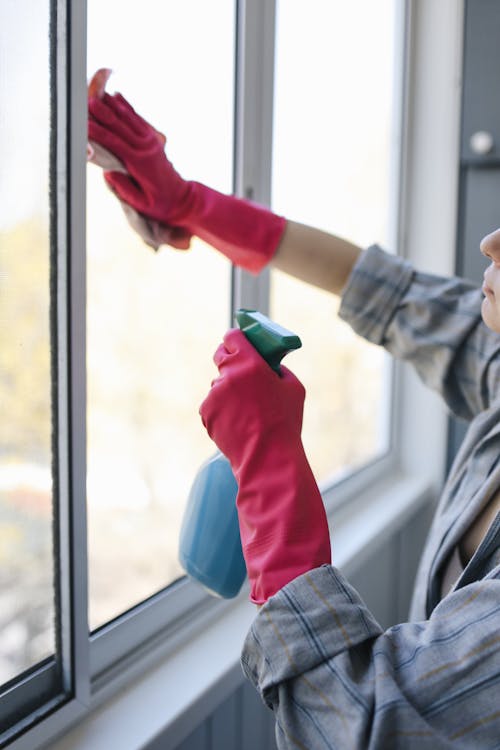
Conclusion: Choosing the Right Ammonia Cleaner
Selecting the appropriate ammonia cleaner is crucial for effective cleaning and stain removal. With a pH of 11, ammonia is highly alkaline, making it particularly adept at cutting through grease and grime on surfaces like floors and windows2728. As you navigate the best ammonia cleaner options available, consider factors like the specific types of stains you’re dealing with, whether it be tough dirt or mold. This ammonia cleaner selection guide emphasizes the importance of assessing both your cleaning needs and the surfaces involved to ensure safe and effective use.
While ammonia-based cleaners are often economical and effective, it’s essential to acknowledge their potential health impacts, such as respiratory issues and eye irritation if inhaled29. Purchasing cleaners that disclose ingredients like “ammonia hydroxide” or “NH3” on their labels will assist in making informed decisions29. Moreover, those interested in eco-friendliness should explore non-toxic alternatives that deliver respectable cleaning results while minimizing environmental harm.
Ultimately, choosing ammonia cleaner requires careful consideration of safety precautions, especially when children and pets are around29. By being informed and aware of the risks and benefits, you can confidently select the best ammonia cleaner that meets your cleaning needs while also protecting your home and environment.
FAQ
Q: What is ammonia cleaner?
A: Ammonia cleaner is a potent cleaning solution that utilizes ammonia, a compound of nitrogen and hydrogen, to effectively break down dirt, grease, and tough stains on various surfaces.
Q: How does ammonia cleaner work?
A: Ammonia cleaner works by breaking down oils and stains on a molecular level, making dirt easier to wipe away. Its powerful cleaning properties make it ideal for tackling grime from animal fats, vegetable oils, and cooking grease.
Q: Is ammonia cleaner safe to use?
A: Yes, ammonia cleaner can be safe when used responsibly. It’s important to wear gloves, ensure proper ventilation, and never mix ammonia with bleach, as this can produce toxic fumes.
Q: What are the benefits of using ammonia cleaner?
A: The benefits of ammonia cleaner include its cost-effectiveness, ability to cut through tough stains on various surfaces, leaving a streak-free shine, and its versatility for different cleaning tasks, including jewelry cleaning for certain metals.
Q: Can I use ammonia cleaner on all surfaces?
A: While ammonia cleaner is effective on many surfaces such as glass, tiles, and fabrics, it is essential to check compatibility with specific materials to avoid damage.
Q: How do I create my own ammonia cleaner solution?
A: To make your own ammonia cleaner, mix clear ammonia with water in a well-ventilated area, following the recommended proportions for the surfaces you’re cleaning.
Q: Are there eco-friendly alternatives to ammonia cleaner?
A: Yes, eco-friendly alternatives include vinegar, baking soda, and plant-based cleaners, which can also effectively tackle tough stains without using harsh chemicals.
Q: What should I do in case of an ammonia exposure emergency?
A: In case of ammonia exposure, immediately move away from the area to get fresh air. If irritation persists or if ammonia comes into contact with skin or eyes, seek medical attention promptly.
Q: Are there specific precautions I should take when using ammonia cleaner?
A: Yes, use gloves to prevent skin irritation, work in a well-ventilated area, read manufacturer instructions carefully, and always keep ammonia cleaner out of reach of children.
Q: What are the common customer experiences with ammonia cleaners?
A: Customers often report high satisfaction with the effectiveness and ease of use of ammonia cleaners, though they note the importance of handling them carefully due to the strong odor.

